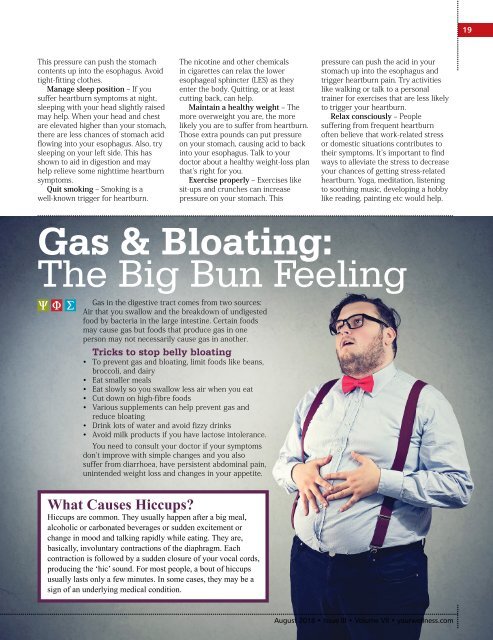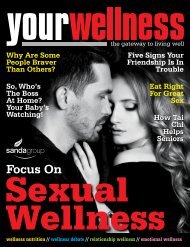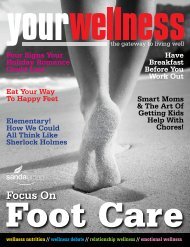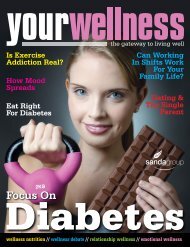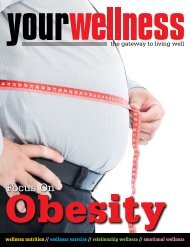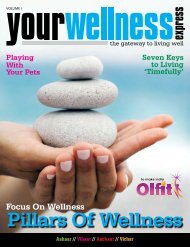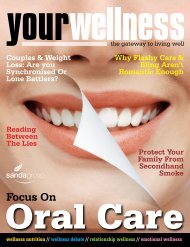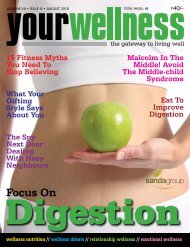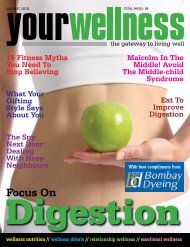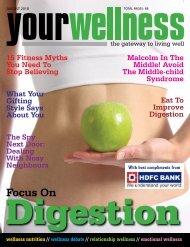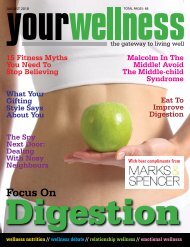You also want an ePaper? Increase the reach of your titles
YUMPU automatically turns print PDFs into web optimized ePapers that Google loves.
19<br />
This pressure can push the stomach<br />
contents up into the esophagus. Avoid<br />
tight-fitting clothes.<br />
Manage sleep position – If you<br />
suffer heartburn symptoms at night,<br />
sleeping with your head slightly raised<br />
may help. When your head and chest<br />
are elevated higher than your stomach,<br />
there are less chances of stomach acid<br />
flowing into your esophagus. Also, try<br />
sleeping on your left side. This has<br />
shown to aid in digestion and may<br />
help relieve some nighttime heartburn<br />
symptoms.<br />
Quit smoking – Smoking is a<br />
well-known trigger for heartburn.<br />
The nicotine and other chemicals<br />
in cigarettes can relax the lower<br />
esophageal sphincter (LES) as they<br />
enter the body. Quitting, or at least<br />
cutting back, can help.<br />
Maintain a healthy weight – The<br />
more overweight you are, the more<br />
likely you are to suffer from heartburn.<br />
Those extra pounds can put pressure<br />
on your stomach, causing acid to back<br />
into your esophagus. Talk to your<br />
doctor about a healthy weight-loss plan<br />
that's right for you.<br />
Exercise properly – Exercises like<br />
sit-ups and crunches can increase<br />
pressure on your stomach. This<br />
pressure can push the acid in your<br />
stomach up into the esophagus and<br />
trigger heartburn pain. Try activities<br />
like walking or talk to a personal<br />
trainer for exercises that are less likely<br />
to trigger your heartburn.<br />
Relax consciously – People<br />
suffering from frequent heartburn<br />
often believe that work-related stress<br />
or domestic situations contributes to<br />
their symptoms. It’s important to find<br />
ways to alleviate the stress to decrease<br />
your chances of getting stress-related<br />
heartburn. Yoga, meditation, listening<br />
to soothing music, developing a hobby<br />
like reading, painting etc would help.<br />
Gas & Bloating:<br />
The Big Bun Feeling<br />
Gas in the digestive tract comes from two sources:<br />
Air that you swallow and the breakdown of undigested<br />
food by bacteria in the large intestine. Certain foods<br />
may cause gas but foods that produce gas in one<br />
person may not necessarily cause gas in another.<br />
Tricks to stop belly bloating<br />
• To prevent gas and bloating, limit foods like beans,<br />
broccoli, and dairy<br />
• Eat smaller meals<br />
• Eat slowly so you swallow less air when you eat<br />
• Cut down on high-fibre foods<br />
• Various supplements can help prevent gas and<br />
reduce bloating<br />
• Drink lots of water and avoid fizzy drinks<br />
• Avoid milk products if you have lactose intolerance.<br />
You need to consult your doctor if your symptoms<br />
don't improve with simple changes and you also<br />
suffer from diarrhoea, have persistent abdominal pain,<br />
unintended weight loss and changes in your appetite.<br />
What Causes Hiccups?<br />
Hiccups are common. They usually happen after a big meal,<br />
alcoholic or carbonated beverages or sudden excitement or<br />
change in mood and talking rapidly while eating. They are,<br />
basically, involuntary contractions of the diaphragm. Each<br />
contraction is followed by a sudden closure of your vocal cords,<br />
producing the ‘hic’ sound. For most people, a bout of hiccups<br />
usually lasts only a few minutes. In some cases, they may be a<br />
sign of an underlying medical condition.<br />
<strong>August</strong> <strong>2018</strong> • Issue III • Volume VII • yourwellness.com


